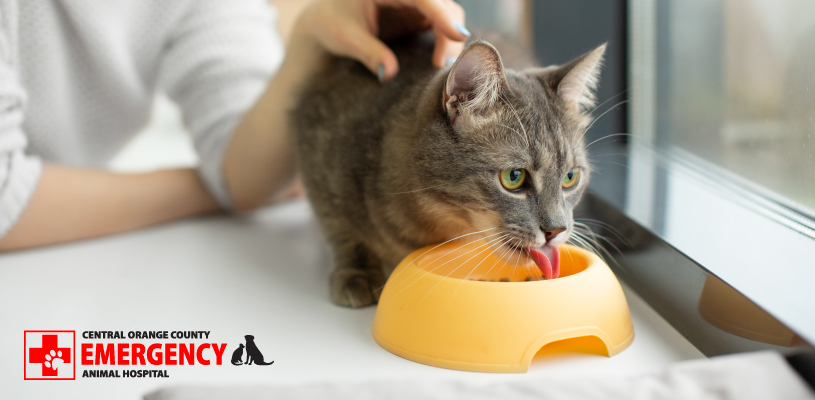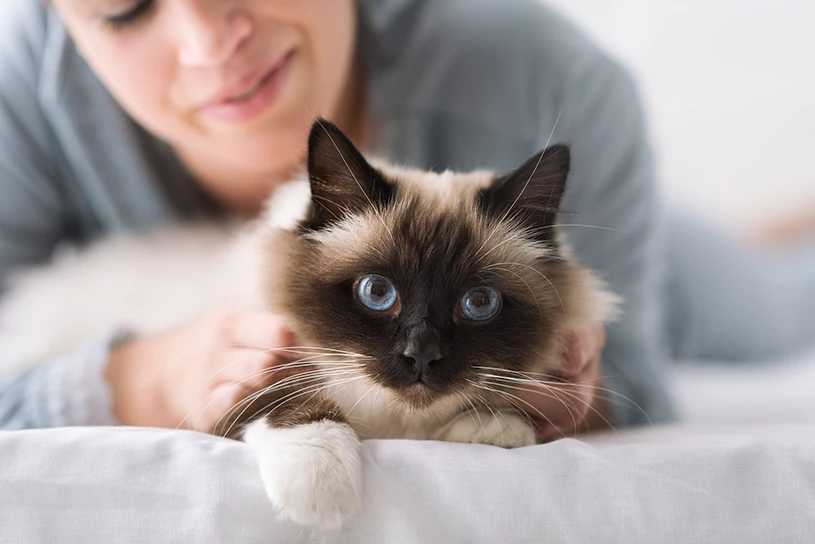Is milk good for cats? How much milk can I give to my cat?
A common image that springs to mind when thinking about cats is one of them happily lapping up a bowl of milk. However, the reality of whether milk is beneficial for cats is not quite as picturesque. This blog post will explore whether milk suits your cat’s diet, how much milk you can safely give your cat, and healthier alternatives.
The Myth of Cats and Milk
The idea that cats need milk is a longstanding myth. In children’s books and old cartoons, cats are often portrayed enjoying a saucer of milk. This imagery has contributed to the popular belief that milk is essential to a cat’s diet. However, veterinarians and animal nutritionists clarify this is more fiction than fact.
Understanding Lactose Intolerance in Cats
As kittens, cats produce an enzyme called lactase, which helps them digest lactose found in their mother’s milk. As cats grow into adulthood, they often produce less lactase, which can lead to lactose intolerance. Symptoms of lactose intolerance in cats include:
- Diarrhea
- Bloating
- Abdominal pain
- Gas
Feeding your adult cat regular cow’s milk can cause digestive disturbances and discomfort due to the cat’s inability to digest lactose properly.
How Much Milk Can Cats Drink?
Since many adult cats are lactose intolerant, veterinarians generally advise against giving your cat milk. If you choose to test how your cat reacts to milk, it should be done cautiously. Here are a few guidelines:
Start Small: Begin by offering a small amount of milk, such as a tablespoon. Observe your cat for signs of digestive upset over the next 12 hours.
Specialty Cat Milk: If your cat enjoys milk and shows no signs of intolerance, consider switching to specially formulated cat milk that is lactose-free. These products are designed to cater to a cat’s dietary needs without the risks associated with lactose.
Historical and Cultural Significance of Cats and Milk
The image of cats drinking milk is deeply embedded in our cultural consciousness, tracing back to ancient times. Historically, cats were prized for controlling pests, and farm cats often had access to fresh cow’s milk. Over the centuries, this iconic scene has been portrayed in numerous artworks, literature, and media, reinforcing the association between cats and milk.
Exploring Safe Treats and Supplements for Cats
For cat owners looking to provide their pets with treats that are both safe and enjoyable, there are numerous options beyond milk:
Commercial Cat Treats: Many brands offer treats formulated specifically for cats. These treats include necessary nutrients and are designed to be easily digestible.
Homemade Treats: For those who prefer a more hands-on approach, homemade treats can be made from safe ingredients like cooked fish, chicken, or liver. Ensure these are cooked without any harmful additives like onion or garlic powder.
Diet and Exercise: Maintaining your cat’s regular diet with high-quality cat food and ensuring sufficient physical activity is vital for their overall health.
Understanding the Essentials of Feline Nutrition Across Life Stages
When it comes to feeding your cat, understanding the variety of dietary options and essential nutrients is key to ensuring a healthy, balanced diet. Cats require specific nutrients that can vary at different life stages, and the choice between dry foods, wet food, and raw meat diets often depends on their individual health needs and preferences.
Types of Cat Food
Dry Foods: These are popular for convenience and often help keep your cat’s teeth clean. However, choosing high-quality dry food with adequate levels of fatty acids and other essential nutrients is crucial.
Wet Food: This food benefits hydration and is generally richer in protein. It can be particularly beneficial for weight management as it is lower in calories but higher in volume.
Raw Meat: Some pet owners feed their cats a raw diet, which can mimic what cats eat in the wild. This diet must be carefully balanced to meet all nutritional needs.
Important Nutrients
Cats need a range of essential nutrients to stay healthy:
Proteins and Fatty Acids: Vital for energy and overall health, these are abundantly found in animal—and plant-based sources. Omega-3 and Omega-6 fatty acids are crucial for maintaining healthy skin and a shiny coat.
Vitamins and Minerals: These support various bodily functions and prevent diseases. A balanced diet ensures your cat gets these nutrients in the right amounts.
Considerations for Pet Owners
As a pet owner, it’s important to be aware of the risks associated with certain types of diets:
Human Foods: These can often be dangerous for cats as many ingredients that are safe for humans are toxic to felines.
Weight Gain: Monitoring your cat’s diet to prevent weight gain is crucial, as obesity can lead to serious health issues.
Pet food choices and nutritional content should reflect your cat’s life stage, from kitten to senior, to ensure its dietary needs are met. Regularly discussing your cat’s diet with a veterinarian is a good practice to maintain optimal health.
Nutritional Needs of Cats: What You Need to Know
Cats are obligate carnivores, meaning their bodies are fine-tuned to extract nutrients from animal products. Understanding the basic nutritional needs of your cat is crucial for maintaining their health. A balanced diet for a cat primarily includes high levels of protein, moderate amounts of fats, and minimal carbohydrates. Essential vitamins and minerals must also be incorporated to support their metabolic needs. Here are some key nutrients that should not be missed:
Protein: As primary carnivores, cats require proteins like chicken, turkey, and fish, which should be the mainstay of their diet.
Taurine: An essential amino acid, taurine is critical for heart health, vision, and reproduction. It’s found naturally in meat and is added to commercially prepared cat food to ensure adequate levels.
Fatty Acids: Omega-3 and Omega-6 fatty acids help maintain a cat’s shiny coat and healthy skin. They also play a vital role in the brain development of kittens and overall health.
Common Misconceptions About Cat Diets
There are several myths surrounding what is suitable for cats to eat. Addressing these can help cat owners make better dietary choices for their pets:
Cats can eat dog food: This is a dangerous myth. Dog food lacks the necessary levels of protein and taurine, making it wholly unsuitable for cats.
Raw diets are always better: While they can offer fresh proteins, they must be handled carefully to avoid bacterial contamination. Consult with a vet before switching to a raw diet.
All fish is good for cats: While fish can be a good source of protein, it should not be a daily food as it lacks certain nutrients essential for cats and can lead to deficiencies if fed exclusively.
How to Transition to New Foods Safely
Introducing your cat to new foods, especially if you’re transitioning from milk or trying new treats, should be done gradually to avoid upsetting their stomach. Start by mixing a small amount of the new food with their current food and gradually increase the proportion over a week. This method helps their digestive system adjust and allows you to monitor them for adverse reactions.
Optimizing Your Cat’s Diet for Health and Wellness
Understanding the delicate balance of your cat’s diet is crucial for maintaining their health and preventing various health issues. As cat owners, it’s essential to recognize that while cat milk products available in the market are specifically formulated to be safe and digestible, they should still be given as an occasional treat rather than a regular part of their diet.
Cats have specific nutritional requirements that differ significantly from humans. Human foods can often lead to digestive issues and food allergies in cats. Therefore, it’s important to avoid feeding your feline friends foods that are safe for humans but potentially harmful to them. Moreover, regular consumption of inappropriate foods can lead to stomach upset and other health complications.
Considering a cat’s natural diet, raw diets can provide a rich source of essential amino acids like taurine, which are vital for a cat’s health. However, any diet, including raw diets, must be carefully balanced to ensure it meets your cat’s nutritional needs and does not contribute to food allergies or digestive issues.
Lastly, engaging with a veterinarian to discuss your cat’s specific dietary needs can help you make informed decisions that benefit their health. Remember, each cat is unique, and their diet should be tailored to their individual health requirements and life stage to prevent health issues and ensure a long, healthy life.
Concerned about your cat’s diet or noticing signs of dietary intolerance? Contact Central Orange County Emergency Animal Hospital. Our expert team is here to help ensure your cat remains healthy and happy. Schedule an appointment today to discuss your cat’s nutritional needs and more.



